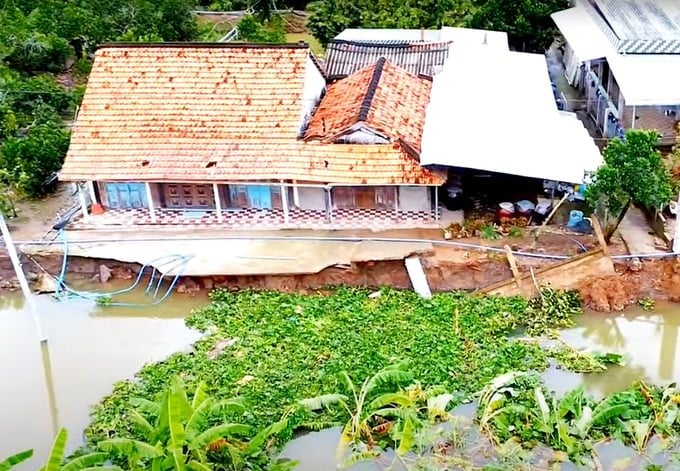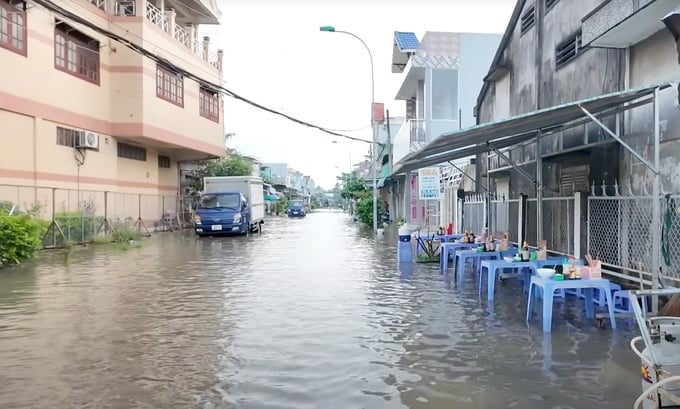June 16, 2025 | 01:18 GMT +7
June 16, 2025 | 01:18 GMT +7
Hotline: 0913.378.918
June 16, 2025 | 01:18 GMT +7
Hotline: 0913.378.918

Riverbank landslide in Tien Giang. Photo: Son Trang.
According to Deputy Minister of Agriculture and Rural Development Nguyen Hoang Hiep, in nearly a year, the Prime Minister has twice issued a document assigning the Ministry of Agriculture and Rural Development (MARD) to have a comprehensive solution for the situation of subsidence, landslides, flooding, drought, saltwater intrusion, and domestic water in the Mekong Delta.
Implementing the Prime Minister's direction through the two documents mentioned above, MARD assigned the Southern Institute of Water Resources Research to urgently develop a "Project to prevent subsidence, landslides, flooding, drought, and saltwater intrusion in the Mekong Delta" (referred to as the Project).
At the report session on the draft Project, Dr. Tran Ba Hoang, Director of the Southern Institute of Water Resources Research, said that the Mekong Delta currently has 94% of the area with an elevation of less than 2 m that is very sensitive to flooding, flood tides, and saltwater intrusion. The Mekong Delta has soft geology, so it is easy to erode.
In recent times, there have been three factors that are having a strong impact on the Mekong Delta: development upstream of the Mekong River; climate change - rising sea levels; and subsidence and lowering of the river bed. Of which, development upstream of the Mekong River is contributing to increased saltwater intrusion, increased coastal erosion, and a lack of fresh water. Climate change causes flooding and increases saltwater intrusion. Subsidence and lowering of the river bed also increase saltwater intrusion, flooding, and difficulty in terms of water drainage.
Due to the impact of development upstream of the Mekong River, flood season flow in the Mekong Delta is fluctuating in a downward trend compared to before. Specifically, from 2011 and earlier, every 4–5 years there would be a medium or large flood. But since 2012, small floods have continuously appeared, and no flood peak has exceeded alert level 3. In the distant future, about 30–50 years from now, the number of years with large floods will be almost negligible, and years with small floods, even without floods, will increase sharply.

Flooding in Can Tho City. Photo: Son Trang.
Since 2013, saltwater intrusion has appeared 1–1.5 months earlier than in the 2004–2012 period. The peak of the saltwater intrusion season has also shifted 1–1.5 months earlier than in the 2004–2012 period. In the dry season of 2023–2024, saltwater intrusion appeared at the end of December 2023, 1 month earlier than the average for many years.
Saltwater intrusion is continuing to increase. It is forecast that by 2030, the salinity boundary of 4 g/l will increase by an average of 3.34 km compared to the present; by 2050, it will increase by an average of 6.7 km compared to the present.
The situation of subsidence in the Mekong Delta is also happening continuously. Surveys by the Ministry of Natural Resources and Environment show that the Mekong Delta is being subsided by an average of 0.5–3 cm/year; coastal areas alone experience subsidence at an average of 1.5–2.5 cm/year. Assuming the rate of subsidence is not controlled (still maintained at the current level), the Mekong Delta commonly subsides from 0.5 to 3 cm/year, except the Ca Mau peninsula sinks at 1.5–3 cm/year. It is forecast that by 2100, many areas in the Mekong Delta will be lowered by 1.5–2.0 m.
Meanwhile, riverbank and coastal landslides in the Mekong Delta are appearing more and more often. In particular, landslides have occurred due to drought.
Speaking at the project reporting session, many experts and managers said that the Project must approach issues in the direction of natural disaster risk management in the Mekong Delta and pay attention to non-structural solutions such as reorganizing agricultural production, improving forecasting and warning capacity, etc.
Deputy Minister of Agriculture and Rural Development Nguyen Hoang Hiep emphasized: The "Project to prevent subsidence, landslides, flooding, drought, and saltwater intrusion in the Mekong Delta" must comprehensively address landslides, subsidence, flooding, drought, saltwater intrusion, and domestic water. With these issues, it is compulsory to base them on practical conditions to solve them step by step, but there are things that must be resolved thoroughly, such as Western coastal landslides, a lack of domestic water, etc. In addition to structural solutions, non-structural measures must also be included in the project, especially converting agricultural production according to planning and water sources. Besides, it is necessary to emphasize improving forecasting and warning capacity in fields under the management of the agricultural sector and provide solutions in science and technology.
Translated by Thu Huyen

(VAN) The working delegation from the Ministry of Agriculture and Environment conducted an important trip to the Netherlands to strengthen strategic partnerships and sustainable development in the agricultural sector.

(VAN) The letter ‘A Plea from the Ocean’ not only evokes emotion but also awakens the human conscience to the responsibility of protecting life on Earth.

(VAN) The Department of Agriculture in South Africa has announced the country’s first mass vaccination of poultry to prevent local birds from contracting avian influenza.

(VAN) Establishment of the Mekong Delta Regional Agricultural Linkage Center, aiming for a closed value chain, deep processing, trading platforms, and international market connectivity.

(VAN) Gia Lai province has recently recorded 460 rare species of animals and plants, contributing to forest conservation and biodiversity planning in the region.

(VAN) Ms. Caroline Beresford, New Zealand Ambassador to Vietnam, expressed confidence that agricultural cooperation between Vietnam and New Zealand will develop sustainably, be climate-resilient, and promote gender equality.

(VAN) Vietnam reaffirms its commitment to international cooperation in fostering sustainable and responsible fisheries while ensuring resilient livelihoods for small-scale fishing communities.